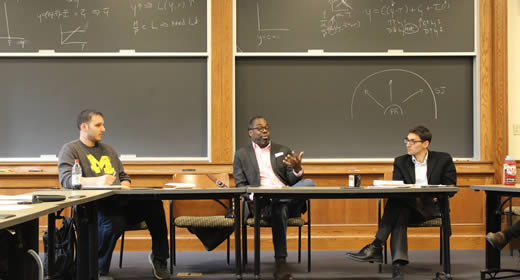
Dina Emam (MPP/MAE '18) shared an intimate glimpse into the life of a Cambodian refugee. Kyle Enochs (MPP '18) tackled restrictions on rural broadband expansion. Hannah Bauman (MPP '18) challenged the teacher certification system. Lee Taylor-Penn (MPA/MPH '17) reflected on black land loss in her home state of Mississippi.
These and other stories were written last winter during Alex Ralph’s first “Storytelling in Policy Writing: People and Numbers” course.
A long-time instructor for “Introduction to Policy Writing” (Ford’s crash course on effective policy memos), Ralph recognizes that the memo is the “gold standard at the Ford School.” But he also wanted to offer a supplementary course where students could reflect on policy issues that resonated with them—and write about them at greater length. “Students hunger for getting to write in a more human, flesh-and-blood way,” he says.
Taylor-Penn’s desire to think creatively about how to explicate policy inspired her to take the class. “I wanted to learn how to leverage the power of narrative in policymaking,” she explains, and Storytelling in Policy Writing did not disappoint. Ralph says the course brings attention to both craft and voice, and he poses the frame: “How do you distill complex information—often complex quantitative information—into a policy piece for a lay person?”
The syllabus assembles work from a range of journalists, economists, and policy experts for students to analyze; while the content is largely focused on domestic policy, Ralph intentionally incorporates diverse and underrepresented perspectives. The point, he says, is not to agree with every writer, but to investigate and glean lessons from their rhetorical techniques, a practice he calls “productive theft.” Along the way, Ralph encourages students to explore elements of craft (e.g. anecdotes, metaphor), as style and form can be powerful tools for illustrating the urgency of policy challenges.
Both Ralph and his students also express a desire to humanize policymaking. The memo, with its tightly defined audience and genre conventions, can sometimes portray people as abstractions, Ralph says. "People are at the center of policy, and yet oftentimes our singular focus on quantitative measurement removes the human element entirely," says Bauman, who believes the course grounded her policy thinking "in real people and real solutions." No one will care about numbers, she says, "if they aren't grounded in reality, which is grounded in people.”
Losing sight of the human element is a risk every policy student faces when they’re in the classroom. Policies are lived realities—they can be a death sentence or someone’s saving grace. A goal of Storytelling in Policy Writing is to encourage students to grapple with their own thorny relationships with the policies they study. And by doing so, perhaps they will discover a bit more grace in their own lives and prose.
--Story by Leah Squires (MPP/MA '20). Storytelling in Policy Writing wil be offered again in Winter 2018.